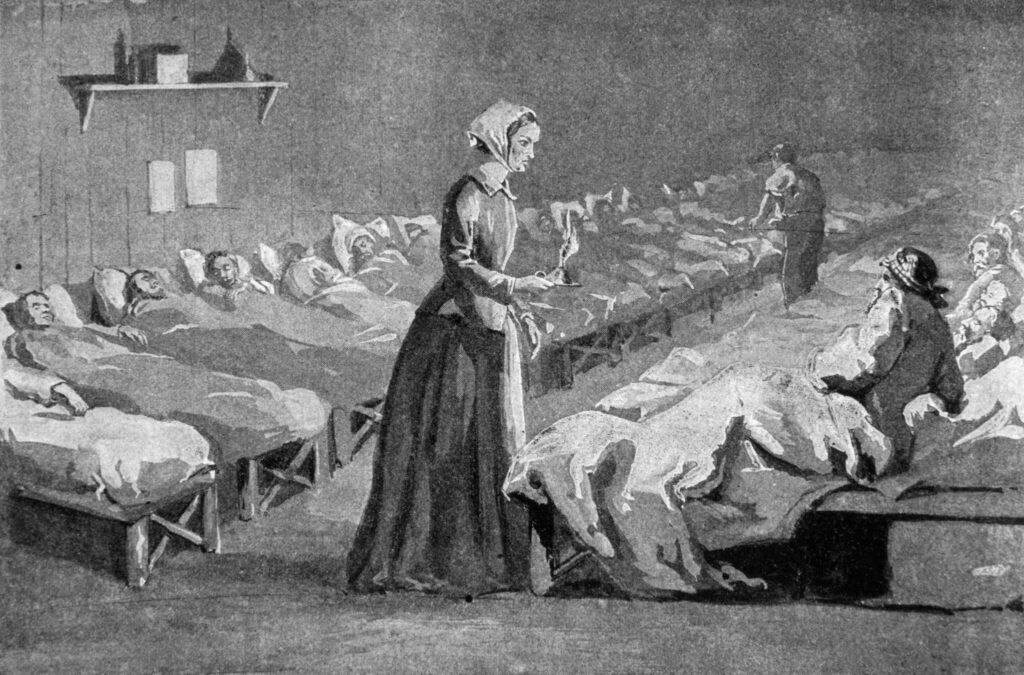
Personal Life Story of Florence Nightingale
The famous English nurse Florence Nightingale was born on May 12, 1820 to well-do-do parents at their temporary residence in Florence, Italy. She was named Florence after her birthplace. Her father William Edward Shore inherited in 1815 a large fortune from his great uncle peter Nightingale and so adopted his name and came to be called William Edward Nightingale.
The name of her mother was Frances Nightingale. Florence was their second child. Florence was brought up at Derbishire, Hampshire and London where the Nightingale had temporary homes. She was largely educated by her father and mother.
Florence was very much interested in nursing and wanted to become a nurse but her parents and elder sister refused her request to study nursing a hospital. They persuaded her to become a parliamentary reporter. Soon she became a expert in hospitals. Public health and such other matters.
|| Truth behind of Her success ||
At that time nursing was not considered a respectable profession and the girls from lowest classes of the society chose it as their career. They were not much educated either and worked in very degrading and discouraging conditions.
In spite of the strong opposition from her parents, she visited hospitals and patients in England and continental Europe. In 1846 she came to know about Protestant Deaconesses institute at Kaiserwerth in Germany through a friend. This institution was set up by a Lutheran pastor called Filender who was a reformist. The institutions gave training to nurse for a period of five years. Mainly discharged female prisoners opted to become nurse and came here for training.
Florence chose this institution for her training and became its student. After her training at Kaiserwerth she was appointed superintendent in October, 1853 of the institution for the Care of Sick Gentlewomen, in London. Then she was thirty-thrice years old. Florence liked her work and duties at the hospital which provided her deep experience in practical nursing and supervision.
|| What is role of Nightingale in Crimean War? ||
The Crimean War broke out in 1853 involving Russia and Turkey as enemies. Later Britain and France joined the war and sent their fleets to the Black Sea to protect Turkish coasts and thus became Turkey’s allies. The allied forces fought a pitched battle at Alma River and then laid siege to the town of Sebastopol. Russia made a strong attempt to remove the siege which led to the battle of Balkalva followed by the battle of Inkerman in November. These major fights ended in the victory of the Allied forces.
During the battle of Balaklava the British Light Brigade emerged victorious but about 250 of the 673 men in the Brigade were killed or wounded. During this bloody battle Florence Nightingale volunteered her services. She was made head of the nurses in the military hospitals in Scutari. Turkey. When she reached Scutari more and more soldiers were dying from fever and infection than from battle wounds.
|| Responsibilities of Nightingale and Met Queen Victoria ||
Nightingale made a request for scrubbing brushes and took strict measures to enforce sanitary regulations. She introduced special diets funds she brought linen, shirts, food, beds, etc. for the wounded and sick soldiers. Confidentiality her health broke down and she contracted Crimean fever and almost died but she refused to leave Turkey.
Her famous. She returned to England and met Queen Victoria and other dignitaries and requested them for donations. From 1857 she lived as money to open the Nightingale School for Nurses. This was her direct response to the terrible sights she had witnessed during the Crimean War. During this war about 4,600 British soldiers died fighting’s, but a further 17,500 he died of disease.
Florence Nightingale campaigned through correspondence for hospital reforms and enforcement of high professional standards in caring for the sick, wounded and diseased. She ultimately established nursing as a noble and respectable career for women. She came to be popularly known as “The Lady with The Lamp”. She remained confined to her home in Park Lane during the last fifteen years of her life as her health deteriorated.
|| Achievements of Florence Nightingale and Last Day of Life ||
In 1907 King Edward VII awarded her the Order of Merit. She was the first woman to receive this award. She died on August 13, 1910 in London at the age of 90 years and was buried at East Wellow, Hampshire besides her father and mother. She had also devoted many years of her life in the improvement of nursing and public health in India.
Today nursing is a respectable and specialized profession. Nurses look after the health, physical and emotional problems of the individuals and families. They take care of sick, injured for wounded and nurse them back to health and normal living. In case a patient to adjust emotionally and physically to the prospect of disability or death.
They also help in preventing future illness. The sole credit for revolutionizing the profession of nursing goes to Florence Nightingale. Through her services during the Crimean War, later by setting up the Nightingale school for Nurse and her writings and correspondence, she set forth the principles of nursing. All prevailing systems of nursing throughout the world are based on the system originally set up by her. Consequently, it is called the Nightingale system.
|| Conclusion in summary ||
Today nurse well trained, educated and professionally registered. They have to obtain a license to practice nursing. There is specialization have master’s degree or a doctorate. We are in great need of such specialists, nurse midwives, nursing anesthetics etc. Nurses play a very significant role in keeping us healthy, disease free and happy. Life cannot be thought of without nurse, the ladies with lamps of hope, health, good cheer and glow.
